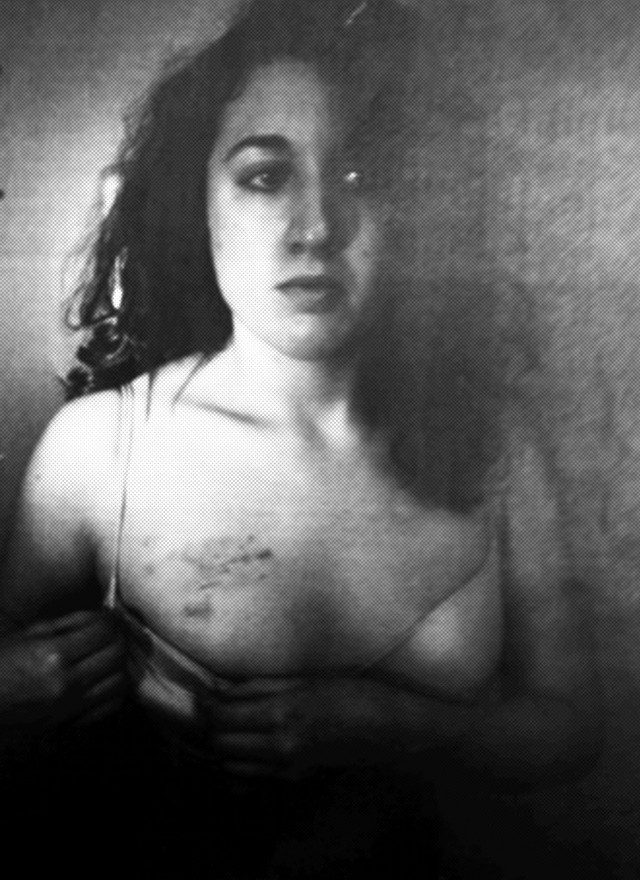Published April 23, 2014 at 10:00 a.m.
The masculine control of women's bodies is a good cop-bad cop game. The good cop is the law, promising protection and enforcing it with licit violence; the quid pro quo is feminine weakness and subordination.
The bad cop is humiliation or violence for unfeminine insubordination, which might include flirting while drunk and still not wanting to hook up, or snubbing a street harasser. Every woman knows how fast an irritated response to an uninvited "compliment" from a stranger can turn to insult or threat — or worse.
But the good cop and the bad cop are partners. They can trade roles. Sometimes one cop plays both roles simultaneously. I mean that literally: cops can play both roles.
In a recent high-profile case, for instance, two New York City police officers were charged with raping a woman in her apartment — one did the act; the other kept watch. The officers had escorted their victim home because she was too drunk to make it alone.
In Detroit this month, an officer sexually molested a woman while responding to her domestic-abuse call.
At home, cops are all too frequently batterers themselves — driven by a combination of stress and violence on the job and the trait that makes a lot of guys want to be police officers in the first place: machismo.
Still, this has got to be a new low: A cop grabs a woman's breast, the woman reacts by elbowing him, and the woman is arrested and charged with felony assault.
That woman's trial is transpiring now in Manhattan criminal court. She is 25-year-old, 5-foot-4-inch union organizer, student and Occupy Wall Street activist Cecily McMillan. Her "victim" is NYPD Officer Grantley Bovell, 5-foot-11, buff and, of course, in possession of gun, club, tear gas and the legal right to use them against civilians.
The scene of the "crime" was Zuccotti Park, March 17, 2012, a St. Patrick's Day celebratory reoccupation of the park on Occupy Wall Street's six-month anniversary. According to McMillan, she had stopped by Zuccotti on the way to some late-night St. Patrick's Day reveling when police announced they were clearing the park. As she was walking out, she felt someone grab her breast from behind and yank her hard. Reflexively, she lurched from his grasp; her elbow swung back into an eye. The eye turned out to belong to a police officer, Bovell.
On the stand, the handsome, bespectacled officer told it differently. He was courteously "escorting" an agitated McMillan to the periphery of the park when she jumped up, assaulted him and ran, at which point he had to subdue and arrest her.
Like everything at Occupy, the incident was recorded by multiple cellphones. In a tape shown at trial, McMillan, in a short green dress inappropriate for camping, indeed leaps forward, her elbow swinging. She clips Bovell; that much is clear. The jury saw photos, taken by the police, of his shiner.
What happens next is less clear. McMillan falls to the ground; cops appear to set upon her. Bovell leans over her. Someone is holding her down, someone pulling at her arms. A woman's voice says, "That's Cecily. Are they beating her?" Then McMillan is rolling and twitching; occasionally she goes immobile. "She's seizing!" onlookers scream as the cops drag her to the curb and watch her writhe. After a long time, an ambulance comes.
Bovell says McMillan "laid on the floor" and played dead — referring either to nonviolent passive resistance or her seizure-induced immobility.
What happened before McMillan's leap, though — the moment that might show intent or its absence — is lost in chaos and darkness.
There are signs that Bovell is morally challenged. He was involved in a vast ticket-fixing scandal in his Bronx precinct, where officers routinely "reached out" to their union reps to disappear their own and their loved ones' parking and speeding summonses. In court, he testified that it didn't occur to him not to participate; everyone did it.
And, though he appears calm and genial in court, he's apparently a hothead on the job. He has been disciplined, for instance, for running a motorcyclist off the road in an arrest. An Occupy protester is also filing a federal lawsuit alleging that, on the same night as McMillan's arrest, Bovell and another cop intentionally cracked the litigant's head against the seats while loading him onto the bus transporting arrestees.
A friend who's been observing the trial theorizes that Bovell took his response to the accidental elbowing as far as he did because he just would not stand getting a black eye from a girl.
But David Graeber, a writer and Occupy participant, makes a credible case that Bovell isn't the single bad apple. It's well documented that the NYPD were especially brutal in their treatment of Occupiers. In three months they made more than 2,500 arrests; from these, the district attorney could wring only a handful of serious indictments.
Furthermore, Graeber says the police have been using sexual humiliation as a deliberate tactic, at least from that St. Patrick's Day on, when some Occupiers set up camp in Union Square. "On March 17 there were numerous reported cases" of breast grabs by police, he writes on nakedcapitalism.com, "and in later nightly evictions from Union Square the practice became so systematic that at least one woman told me her breasts were grabbed by five different police officers on a single night (in one case, while another one was blowing kisses)."
Other Occupy activists told me about a 16-year-old girl whose shirt opened in a contretemps with police. The cops picked her up and carried her bare-breasted through the crowd.
Graeber suggests that getting rough with women is an old tactic of police brutality: The mistreatment is calculated to provoke the male protesters to intervene — and create the kind of "riot" that justifies bashing heads. McMillan's battery doesn't look premeditated, but if it was, it didn't work. Her male comrades chanted, "Shame, shame," and screamed at the police to call an ambulance. But they didn't fly to the rescue.
There were some Occupy men who relished violent combat with the police. But that night, the male protesters in McMillan's vicinity were either liberated enough to eschew chivalry or smart enough to fear the swinging billy clubs. You might say they were refusing to participate in the age-old violent masculine contest over women's bodies.
Judge Ronald Zweibel — called "a prosecutor with a robe" on lawyers' judge-rating website therobingroom.com — has excluded Officer Bovell's motorcycle incident, as well as the federal lawsuit against him, from evidence in the McMillan case. Also verboten is the end of the videotape where Bovell and the other cops pummel McMillan. The jury won't see the interview with Amy Goodman in which McMillan displays her bruised arms and face and winces in pain from injuries to her back and ribs.
But the jurors will get a look at the hand-shaped black-and-blue mark on McMillan's right breast, photographed by a concerned doctor. It's pretty persuasive.
Even without the handprint, though, McMillan's attorneys feel the absurdity of the prosecution's case and the ambiguities in the videotapes will introduce enough reasonable doubt to acquit her. No one quite knows why the state is pursuing the case at all. Maybe they saw an opportunity to redeem the cops' besmirched reputation after their conduct at Occupy. Maybe they thought a girl would be easy to break.
But they picked the wrong girl. The committed nonviolent activist Cecily McMillan has refused to be sexually shamed: She posted pictures of her breast online. She won't be undone by trauma: Although she has wept at the defense table, she strides through the halls bravely. She is angry, but she does not lash out.
And every day the courtroom is filled with supporters, women and men.
Their slogan might be: Keep your laws, and your paws, off our bodies.
Comments (3)
Showing 1-3 of 3
Comments are closed.
From 2014-2020, Seven Days allowed readers to comment on all stories posted on our website. While we've appreciated the suggestions and insights, right now Seven Days is prioritizing our core mission — producing high-quality, responsible local journalism — over moderating online debates between readers.
To criticize, correct or praise our reporting, please send us a letter to the editor or send us a tip. We’ll check it out and report the results.
Online comments may return when we have better tech tools for managing them. Thanks for reading.










































